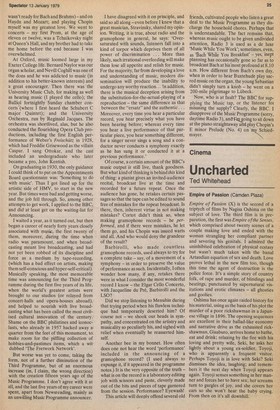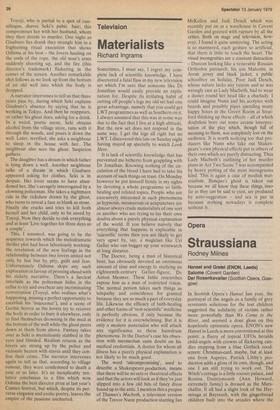Uncharted
Ted Whitehead
Empire of Passion (Camden Plaza)
Empire of Passion (X) is the second of a triptych of films by Nagisa Oshima on the subject of love. The third film is in preparation, the first was Empire of the Senses, which comprised about twenty scenes of a couple making love and ended with the woman strangling her compliant partner and severing his genitals. I admired the uninhibited celebration of physical ecstasy but wasn't much taken with the banal Artaudian equation of sex and death. Love proves lethal in the new film too, though this time the agent of destruction is the police force. It's a simple story of country folk, of rape and murder, of blindings and beatings, punctuated by supernatural visitations and erotic climaxes — all ghosties and goolies.
Oshima has once again raided history for his material, using as the basis of his plot the murder of a poor rickshawman in a Japanese village in 1896. The opening sequences are excellent in their ballad-like economy and narrative drive as the exhausted rickshawman, Gisaburo, arrives home to bathe, eat and drink; relaxing by the fire with his loving and pretty wife, Seki, he asks her lightly about a young ex-soldier, Toyoji, who is apparently a frequent visitor. Perhaps Toyoji is in love with Seki? Seki dismisses the idea, laughing; and remembers it the next day when Toyoji appears again. Toyoji senses something in her manner and forces her to have sex; her screams turn to gurgles of joy, and she covers her ears so she won't hear the baby crying. From then on it's all downhill. Toyoji, who is partial to a spot of cunnilingus, shaves Seki's pubic hair; this compromises her with her husband, whom they then decide to murder. One night as Gisaburo lies drunk they strangle him in a frightening ritual execution that shows Oshima at his best — the lovers hauling on the ends of the rope, the old man's arms suddenly shooting up, and the fire (this director's trademark) flickering in the corner of the screen. Another remarkable shot follows as we look up from the bottom of an old well into which the body is dropped.
A narrator intervenes to tell us that three years pass by, during which Seki explains Gisaburo's absence by saying that he is working in Tokyo. And then he reappears, or rather his ghost does, asking for a drink. In a weird, poetic scene, Seki obtains alcohol from the village store, runs with it through the woods, and pours it down the well. Later, terrified, she asks a neighbour to sleep in the house with her. The neighbour also sees the ghost. Suspicion gathers.
The daughter has a dream in which father is lying down a well. Another neighbour talks of a dream in which Gisaburo appeared asking for clothes. Seki is in despair. Her lover seems to have abandoned her. She's savagely interrogated by a clowning policeman. She takes a nightmare ride in the rickshaw drawn by the ghost, who turns to reveal a face as blank as stone. Finally she cracks and tries to kill both herself and her child, only to be saved by Toyoji. Now they decide to risk everything and at least 'Live together for three days as a couple'.
This, I assumed, was going to be the sequence towards which the melodramatic thriller plot had been laboriously working: the revelation of the new feelings in the relationship between two lovers united not only by lust but by. pity, guilt and fear. Unfortunately Oshima skips any such exploration in favour of pressing ahead with his rickety narrative. There's a farcical interlude as the policeman hides in the cellar to try and overhear any incriminating conversation (Toyoji, who realises what's happening, missing a perfect opportunity to establish his 'innocence'), and a scene of Gothic horror as the lovers try to recover the body in order to bury it elsewhere, only to find themselves drowning in the mud at the bottom of the well while the ghost peers down at them from above. Fantasy takes over as Seki is mysteriously stabbed in the eyes and blinded. Realism returns as the lovers are strung up by the police and viciously beaten with staves until they confess their crime.. The narrator intervenes again to tell us that, according to village rumour, they were condemned to death a year or so later. It's an inexplicably tentative conclusion to a film which won Oshima the best director prize at last year's Cannes festival, but which, despite its perverse elegance and erotic poetry, leaves the empire of the passions uncharted.



































 Previous page
Previous page